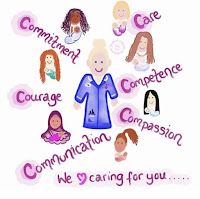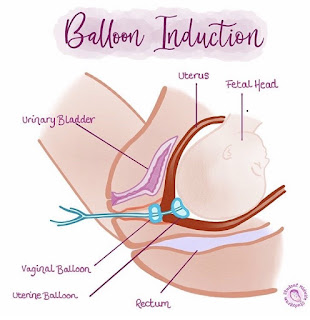Student Survival Guide - How to get through your first Midwifery placement
 |
Hi lovely student midwives/aspiring student midwives! I hope the anxiety of starting your first placement isn't taking you away from enjoying this sunshine - if it is, this post is going to guide you in the right direction.
So, your first midwifery placement - aaaaa - I can literally feel the anxiety as I think back to my first placement! It was on the postnatal ward and I literally knew nothing. How could I? We had had a few weeks of lectures on the anatomy of the human body, one clinical skills session on moving and handling (yawn) and then we were chucked onto the wards, feet first. I walked around in a daze, clinging onto my mentor for safety (in case of what exactly, I do not know). The great thing about your first placement is that the expectations of you are so low that if you turn up with the correct uniform and a smile, then you're already doing fab. Use this time to just get used to your surroundings, how the ward works, who the midwives/doctors/support workers are & try not to ask the top consultant to prescribe paracetamol (just me that did that?)
Your first placement will vary between community or the hospital wards and like me, you probably won't have had a lot of preparation before you start. So, as I am literally holding out my hand for you all to hold & be guided through, I've made a list of 3 top tips for each placement area for you to follow. Thank me later chicks x
Community
- Practice your blood pressure technique in your mentor's clinics. Do every single blood pressure & ask your midwife to check it. You'll be a pro in no time!
- Perfect your urinalysis skills - test every women's urine sample in clinic as they'll all be required to provide one. Ask your mentor to help you interpret the results.
- Take lunch that is quick & easy to eat on the go. You might have to eat between visits in the car!
Postnatal ward
1. Utilise the Maternity Support workers as they get to spend more time with the women than the midwives do. Help them carry out the newborn observations so you can learn the normal limits.
2. Observe breastfeeding support - start to learn the different positions for breastfeeding. Do not try to help though if you haven't yet had the training.
3. The postnatal ward is more than likely SUPER busy, as they always have a lot of beds & minimal staff. Handover will often be long & full of abbreviations you've never heard before, so make sure you go through the hand over once it's finished with your mentor so that you understand this new foreign language!
Delivery suite/Birthing unit
1. Start to get your birth witnesses! If you're lucky you will get all five, but if you seem to end up in theatre every time, don't panic - you will get them eventually.
2. Learn how to communicate clearly with the women, especially when they are in pain or not taking in information clearly. You will learn this skill from your mentor.
3. Take note of the SBAR handover method!
Antenatal ward/Assessment unit
1. Learn how to attach and start a CTG machine for continuous fetal monitoring.
2. Practice maternal observations, particularly your manual blood pressures.
3. Practice abdominal palpation - this will be tricky & take a while to master.
Keeping a little notepad in your pocket is also going to help you massively - take notes of the door codes, toilet codes, where things are kept, normal observation ranges etc. Anything that you think you'll need to remember for your future shifts! Keep in the back of your mind, that how one midwife teaches you may be different to how another one does it, which can be confusing but we all practice slightly differently depending on our own training. Use this to give yourself an idea of the kind of midwife that you want to be.
Good luck!
Han Xx



Comments
Post a Comment
Any thoughts on this post? Let me know!